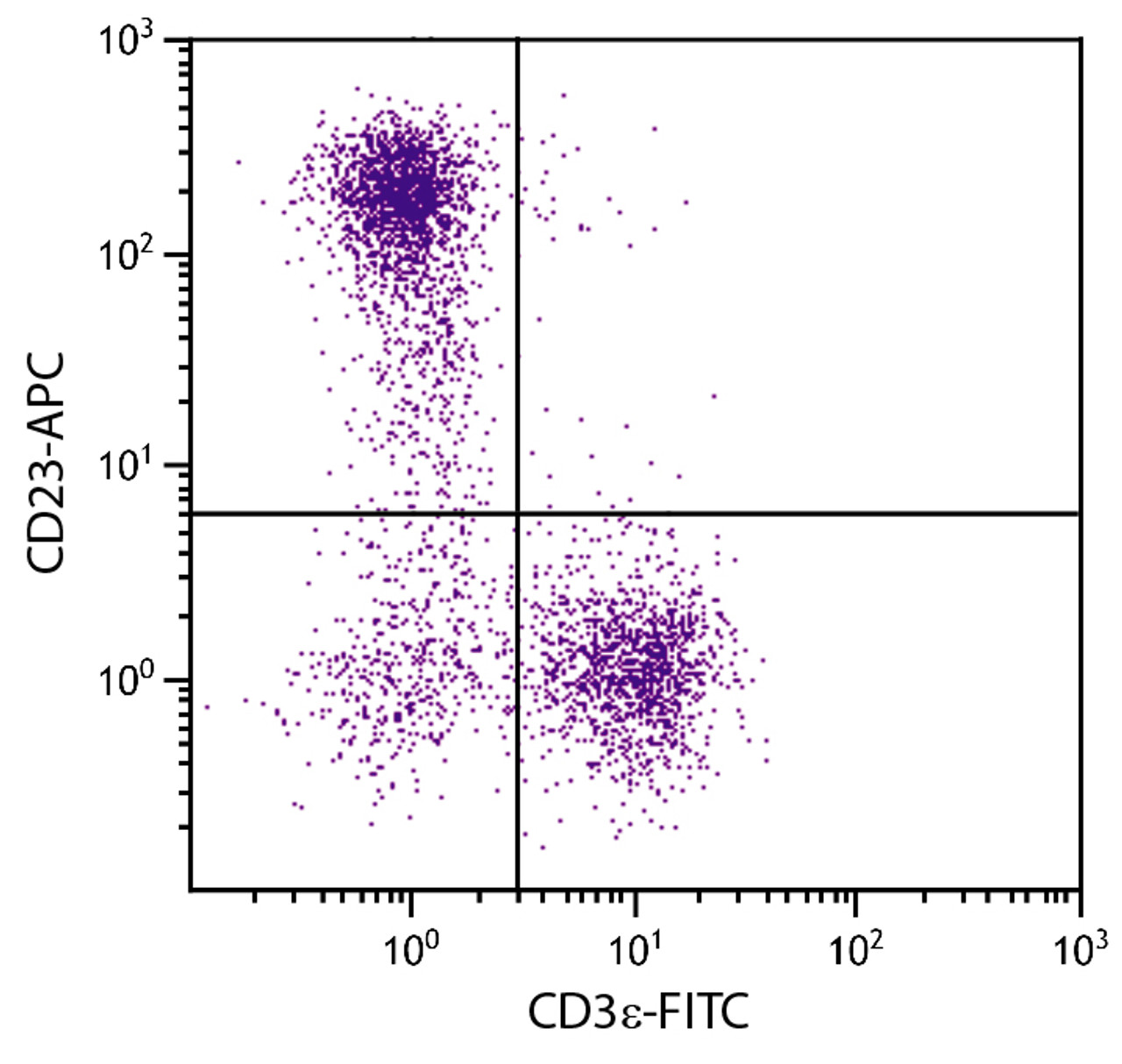Product Description
CD23 Antibody [2G8] (APC) | 98-687 | ProSci
Host: Rat
Reactivity: Mouse
Homology: N/A
Immunogen: FcepsilonR isolated from B cell lymphoma cell line M12.4.5
Research Area: Immunology, Stem Cell, Cancer, Cell Cycle
Tested Application: IHC-P, IHC-Fr, ICC, Flow, IP
Application: CD23 Antibody [2G8] for use in flow cytometry assays.
Specificiy: CD23
Positive Control 1: N/A
Positive Control 2: N/A
Positive Control 3: N/A
Positive Control 4: N/A
Positive Control 5: N/A
Positive Control 6: N/A
Molecular Weight: N/A
Validation: N/A
Isoform: N/A
Purification: N/A
Clonality: Monoclonal
Clone: [2G8]
Isotype: IgG2a
Conjugate: APC
Physical State: Liquid
Buffer: Supplied in PBS/NaN3 and a stabilizing agent
Concentration: 0.1 mg/mL
Storage Condition: Store vial at 2-8˚C
Alternate Name: FcepsilonRII, BLAST-2, low affinity IgE receptor, Ly-42
User Note: Optimal dilutions for each application to be determined by the researcher.
BACKGROUND: The CD23 antigen is the low affinity IgE Fc receptor, which is a 45-49 kDa protein with 38 and 28 kDa fragments. It is expressed on most mature, conventional B cells (but not on peritoneal CD5+ B cells) and can also be found on the surface of T cells, macrophages and platelets. It is distinct from the high affinity IgE receptors found on basophils and mast cells which mediate allergic reactions. The low affinity receptors are thought to play a role in isotype specific immunoregulation. The regulation of CD23 surface expression appears to be integral with the complex IgE system which involves interactions of cells, cytokines, antibodies and regulatory factors. CD23 has been described as a “membrane bound cytokine, " in that the soluble cleavage products of CD23 are themselves able to act as cytokines in vitro.
 Euro
Euro
 USD
USD
 British Pound
British Pound
 NULL
NULL

![CD23 Antibody [2G8] (APC) CD23 Antibody [2G8] (APC)](https://cdn11.bigcommerce.com/s-452hpg8iuh/images/stencil/1280x1280/products/576069/813618/porsci_lo__79508.1648973713__83534.1649092116.png?c=2)

![CD23 Antibody [2G8] (APC) CD23 Antibody [2G8] (APC)](https://cdn11.bigcommerce.com/s-452hpg8iuh/images/stencil/100x100/products/576069/813618/porsci_lo__79508.1648973713__83534.1649092116.png?c=2)

![CD23 Antibody [2G8] (APC) CD23 Antibody [2G8] (APC)](https://cdn11.bigcommerce.com/s-452hpg8iuh/images/stencil/500x659/products/576069/813618/porsci_lo__79508.1648973713__83534.1649092116.png?c=2)
![CD23 Antibody [2G8] CD23 Antibody [2G8]](https://cdn11.bigcommerce.com/s-452hpg8iuh/images/stencil/500x659/products/576497/814321/porsci_lo__79508.1648973713__67536.1649092211.png?c=2)
![CD23 Antibody [2G8] CD23 Antibody [2G8]](https://cdn11.bigcommerce.com/s-452hpg8iuh/images/stencil/500x659/products/576494/814316/porsci_lo__79508.1648973713__06514.1649092210.png?c=2)
![CD23 Antibody [2G8] (Biotin) CD23 Antibody [2G8] (Biotin)](https://cdn11.bigcommerce.com/s-452hpg8iuh/images/stencil/500x659/products/576496/814319/porsci_lo__79508.1648973713__14196.1649092211.png?c=2)
![CD23 Antibody [2G8] (PE) CD23 Antibody [2G8] (PE)](https://cdn11.bigcommerce.com/s-452hpg8iuh/images/stencil/500x659/products/576068/813616/porsci_lo__79508.1648973713__90822.1649092115.png?c=2)
![CD23 Antibody [2G8] (FITC) CD23 Antibody [2G8] (FITC)](https://cdn11.bigcommerce.com/s-452hpg8iuh/images/stencil/500x659/products/576495/814317/porsci_lo__79508.1648973713__16030.1649092210.png?c=2)
![CD23 Antibody [2G8] (PE-Cy7) CD23 Antibody [2G8] (PE-Cy7)](https://cdn11.bigcommerce.com/s-452hpg8iuh/images/stencil/500x659/products/576070/813620/porsci_lo__79508.1648973713__14733.1649092116.png?c=2)


